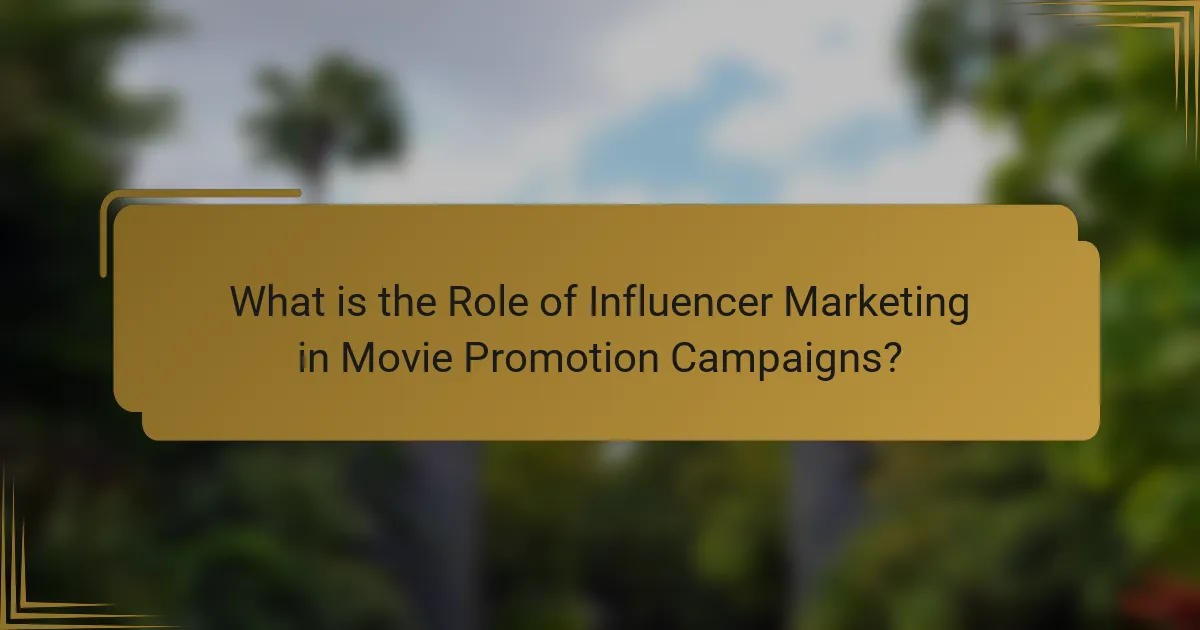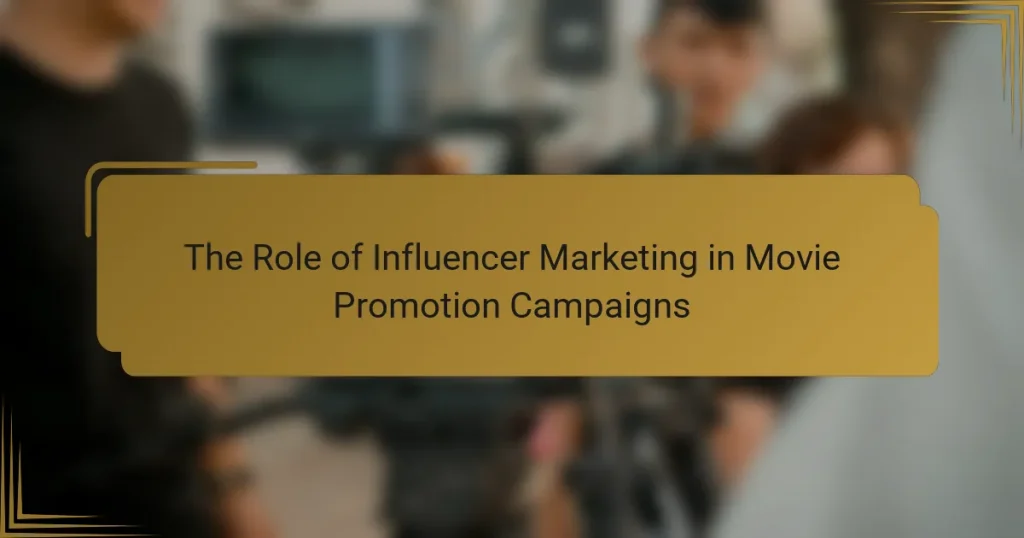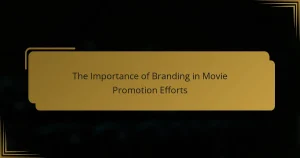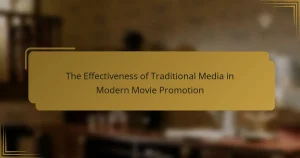
What is the Role of Influencer Marketing in Movie Promotion Campaigns?
Influencer marketing plays a crucial role in movie promotion campaigns. It leverages the reach and credibility of social media influencers to engage target audiences. Influencers create buzz and excitement around a film through authentic content. They share trailers, behind-the-scenes footage, and personal opinions about the movie. This authentic engagement often leads to higher audience interest and ticket sales. According to a study by the American Marketing Association, campaigns with influencer collaborations can see up to 11 times the ROI compared to traditional marketing. Influencers can also tap into niche audiences, enhancing the film’s visibility in specific demographics. Overall, their involvement can significantly amplify a movie’s promotional efforts.
How does Influencer Marketing specifically impact movie promotion?
Influencer marketing significantly impacts movie promotion by leveraging the reach and credibility of social media personalities. Influencers create buzz around films by sharing trailers, reviews, and behind-the-scenes content. This can lead to increased audience engagement and anticipation prior to a movie’s release. For instance, a study by the Digital Marketing Institute found that 49% of consumers depend on influencer recommendations when making purchasing decisions. Influencers often have dedicated followers who trust their opinions, making their endorsements valuable. In addition, influencer campaigns can target niche audiences effectively, aligning specific films with relevant demographics. Consequently, movies promoted through influencers often experience higher ticket sales and social media interactions.
What are the key strategies used in Influencer Marketing for movies?
Key strategies in influencer marketing for movies include leveraging social media platforms, collaborating with relevant influencers, and creating engaging content. Social media platforms like Instagram and TikTok are essential for reaching target audiences. Collaborating with influencers who align with the movie’s genre enhances authenticity. Engaging content, such as behind-the-scenes footage or exclusive interviews, generates interest. Influencers can also host giveaways or contests to boost audience engagement. Utilizing analytics to track campaign performance ensures strategies are effective. These approaches have proven successful in increasing movie visibility and audience anticipation.
How do influencers choose which movies to promote?
Influencers choose which movies to promote based on several key factors. They assess the alignment of the film’s themes with their personal brand. Influencers also consider their audience’s interests and preferences. The potential for engagement and audience reach plays a significant role in their decision-making. Additionally, they evaluate the film’s marketing budget and promotional strategy. Influencers often seek partnerships that offer compensation or exclusive access to content. They may also look for films that resonate with current trends or social issues. Ultimately, the decision is influenced by a combination of personal values and audience expectations.
What are the benefits of using Influencer Marketing in movie campaigns?
Influencer marketing in movie campaigns enhances audience reach and engagement. Influencers have established trust with their followers. They can create authentic content that resonates with specific demographics. This targeted approach increases the likelihood of attracting potential moviegoers. Research shows that 49% of consumers depend on influencer recommendations. Influencer campaigns can generate significant buzz prior to a movie’s release. This buzz often translates into higher ticket sales. Additionally, influencer marketing can create lasting brand partnerships for future projects.
How does Influencer Marketing enhance audience engagement?
Influencer marketing enhances audience engagement by leveraging trusted voices to connect with target audiences. Influencers have established credibility and rapport with their followers. This trust translates into higher engagement rates when they promote content. Studies show that influencer recommendations can lead to a 10 times higher engagement rate compared to traditional advertising. Additionally, influencers create authentic content that resonates with their audience, fostering a sense of community. This community involvement encourages discussions and shares, further amplifying reach. In movie promotion, influencers can generate excitement and anticipation, leading to increased ticket sales and viewership.
What measurable outcomes can be expected from Influencer Marketing in film promotions?
Influencer marketing in film promotions can lead to measurable outcomes such as increased audience engagement and ticket sales. Campaigns leveraging influencers often see higher social media engagement rates. For instance, films promoted by influencers can achieve up to 30% more shares and comments. Additionally, ticket sales can increase significantly due to influencer reach. Studies indicate that films with influencer partnerships can see a sales increase of 20% or more. Brand awareness also rises, with surveys showing that 70% of consumers trust influencer recommendations. This trust translates into a higher likelihood of movie attendance. Overall, influencer marketing can effectively enhance visibility and profitability for film promotions.
What challenges are associated with Influencer Marketing in movie promotions?
Influencer marketing in movie promotions faces several challenges. One challenge is the authenticity of influencers. Audiences often seek genuine recommendations, and if influencers appear insincere, it may harm the movie’s reputation. Another challenge is aligning the influencer’s audience with the movie’s target demographic. If the influencer’s followers do not match the intended audience, the promotional efforts may not yield desired results.
Additionally, measuring the effectiveness of influencer campaigns can be difficult. Traditional metrics may not accurately reflect the impact of influencer marketing on ticket sales. Budget constraints also pose a challenge, as high-profile influencers may demand substantial fees that can limit marketing options.
Finally, managing relationships with multiple influencers can be complex. Coordinating messages and ensuring consistency across various platforms requires careful planning and communication. These challenges highlight the need for strategic approaches in leveraging influencer marketing for movie promotions.
How can brands effectively manage influencer partnerships?
Brands can effectively manage influencer partnerships by establishing clear communication and setting defined expectations. This involves outlining campaign goals and deliverables upfront. Regular check-ins can help maintain alignment and address any concerns. Utilizing performance metrics allows brands to assess the effectiveness of the partnership. Research shows that 89% of marketers say ROI from influencer marketing is comparable to or better than other channels. Brands should also prioritize building long-term relationships with influencers for sustained success. This fosters trust and authenticity, which are critical in influencer marketing.
What are the risks of relying on influencers for movie marketing?
Relying on influencers for movie marketing poses several risks. One risk is the potential for misalignment between the influencer’s brand and the film’s message. This misalignment can lead to audience confusion and disengagement. Another risk is the influencer’s credibility; if they lose trust with their audience, it can negatively impact the film’s perception. Additionally, influencers may not have the desired reach or engagement, resulting in ineffective promotion. There is also the risk of backlash if the influencer engages in controversial behavior. According to a 2021 survey by Influencer Marketing Hub, 61% of marketers cited influencer reliability as a significant concern. Lastly, dependence on influencers can lead to a lack of control over the marketing narrative, which may not align with the studio’s vision.
How does Influencer Marketing evolve with changing audience preferences?
Influencer marketing evolves by adapting to changing audience preferences. As audiences become more discerning, brands must align their messaging with genuine influencer content. Authenticity has become crucial, with studies showing that 86% of consumers prefer authentic content. Influencers now focus on building community rather than just promoting products. This shift encourages deeper engagement and trust between influencers and their followers. Additionally, platforms like TikTok have changed content formats, favoring short, creative videos over traditional posts. Data indicates that video content generates 1200% more shares than text and images combined. As audience preferences shift, influencer marketing strategies must continuously adapt to maintain relevance and effectiveness.
What types of influencers are most effective for movie promotions?
Micro-influencers are most effective for movie promotions. They typically have a smaller, but highly engaged audience. Their followers often trust their recommendations more than those of larger influencers. This trust leads to higher conversion rates for movie ticket sales. According to a study by Influencer Marketing Hub, micro-influencers can achieve engagement rates of 7% or higher. In contrast, macro-influencers often see engagement rates below 2%. Additionally, niche influencers who specialize in film or entertainment create targeted content. This specificity resonates with the audience, making promotions more impactful.
How do micro-influencers compare to macro-influencers in film marketing?
Micro-influencers typically have smaller, more engaged audiences compared to macro-influencers. Micro-influencers often achieve higher engagement rates, with some studies showing rates above 7%, while macro-influencers average around 1-3%. This engagement can lead to more authentic interactions with potential moviegoers.
Additionally, micro-influencers usually have lower costs associated with partnerships. Brands can allocate budgets more efficiently when working with multiple micro-influencers rather than a single macro-influencer.
Research indicates that 82% of consumers are more likely to follow a recommendation from a micro-influencer. This trust can enhance the effectiveness of film marketing campaigns aimed at niche audiences.
In contrast, macro-influencers provide broader reach, which can be beneficial for large-scale film promotions. They can quickly generate substantial visibility due to their larger follower base. However, this reach may come at the cost of lower engagement and authenticity.
Ultimately, the choice between micro and macro-influencers depends on the film’s marketing goals, target audience, and budget considerations.
What role do social media platforms play in influencer-driven movie promotions?
Social media platforms are crucial in influencer-driven movie promotions. They provide a space for influencers to share content related to films. This content can include reviews, behind-the-scenes footage, and promotional posts. Influencers leverage their large followings to reach diverse audiences. According to a 2021 study by Nielsen, 70% of millennials trust influencer recommendations. This trust translates into increased awareness and interest in movies. Social media platforms also enable direct engagement between influencers and fans. This interaction fosters a sense of community around the film. Overall, these platforms amplify the impact of influencer marketing in movie promotions.
What are best practices for implementing Influencer Marketing in movie campaigns?
Identify relevant influencers who align with the movie’s target audience. Research their engagement rates and audience demographics. Establish clear campaign objectives, such as increasing awareness or driving ticket sales. Create authentic content that resonates with the influencer’s style and audience. Provide influencers with exclusive access to content or events to enhance authenticity. Track performance metrics, including reach, engagement, and conversions. Adjust strategies based on data insights to optimize future campaigns. Collaborate with influencers over time to build lasting relationships and brand loyalty.
How can movie studios measure the success of their influencer marketing efforts?
Movie studios can measure the success of their influencer marketing efforts through various metrics. These metrics include engagement rates, reach, and conversion rates. Engagement rates reflect how well the audience interacts with influencer content. Reach indicates the total number of people who see the content. Conversion rates show the percentage of viewers who take a desired action, such as purchasing tickets.
Additionally, studios can track social media mentions and sentiment analysis to gauge audience perception. A study by Influencer Marketing Hub found that 63% of marketers believe influencer marketing is effective for brand awareness. This data supports the importance of measuring influencer marketing success. Overall, a combination of quantitative and qualitative metrics provides a comprehensive view of effectiveness.
What strategies can enhance collaboration between filmmakers and influencers?
Filmmakers and influencers can enhance collaboration through clear communication and shared goals. Establishing a mutual understanding of each party’s objectives fosters a productive partnership. Joint brainstorming sessions can lead to innovative marketing ideas. Utilizing influencers’ unique styles helps filmmakers reach diverse audiences effectively. Providing influencers with exclusive content increases their engagement and authenticity. Offering incentives, such as co-branded merchandise, can strengthen the collaboration. Regular feedback loops ensure that both parties align throughout the project. These strategies have proven successful in various campaigns, enhancing visibility and audience reach.
What future trends can we expect in Influencer Marketing for movies?
Future trends in influencer marketing for movies include the rise of micro and nano influencers. These influencers often have higher engagement rates compared to larger counterparts. Brands are increasingly recognizing the value of niche audiences. Authenticity in influencer partnerships will become more critical. Audiences prefer genuine endorsements over scripted promotions. Video content will dominate as platforms favor visual storytelling. Collaborations between influencers and filmmakers will likely increase. Data-driven strategies will enhance targeting and measurement of campaign effectiveness.
How can filmmakers leverage data analytics to improve influencer campaigns?
Filmmakers can leverage data analytics to enhance influencer campaigns by analyzing audience engagement metrics. This involves tracking likes, shares, and comments on influencer posts. By identifying which content resonates most, filmmakers can tailor their messaging accordingly. Data analytics also allows filmmakers to assess the demographics of an influencer’s audience. This ensures alignment with the film’s target market. Additionally, predictive analytics can forecast potential campaign outcomes based on historical data. This helps in optimizing budget allocation for influencer partnerships. Studies show that campaigns informed by data analytics yield higher return on investment. For instance, a report by Nielsen indicated that data-driven campaigns can increase engagement by up to 30%.
The main entity of this article is influencer marketing in the context of movie promotion campaigns. The article explores the significant impact of influencer marketing on audience engagement, ticket sales, and brand visibility through authentic content shared by social media influencers. It outlines key strategies for effective campaign implementation, the benefits of collaborating with influencers, and the challenges faced in managing these partnerships. Additionally, it discusses the effectiveness of micro-influencers compared to macro-influencers, the role of social media platforms, and future trends in influencer marketing for films, emphasizing the importance of data analytics in optimizing campaign outcomes.




